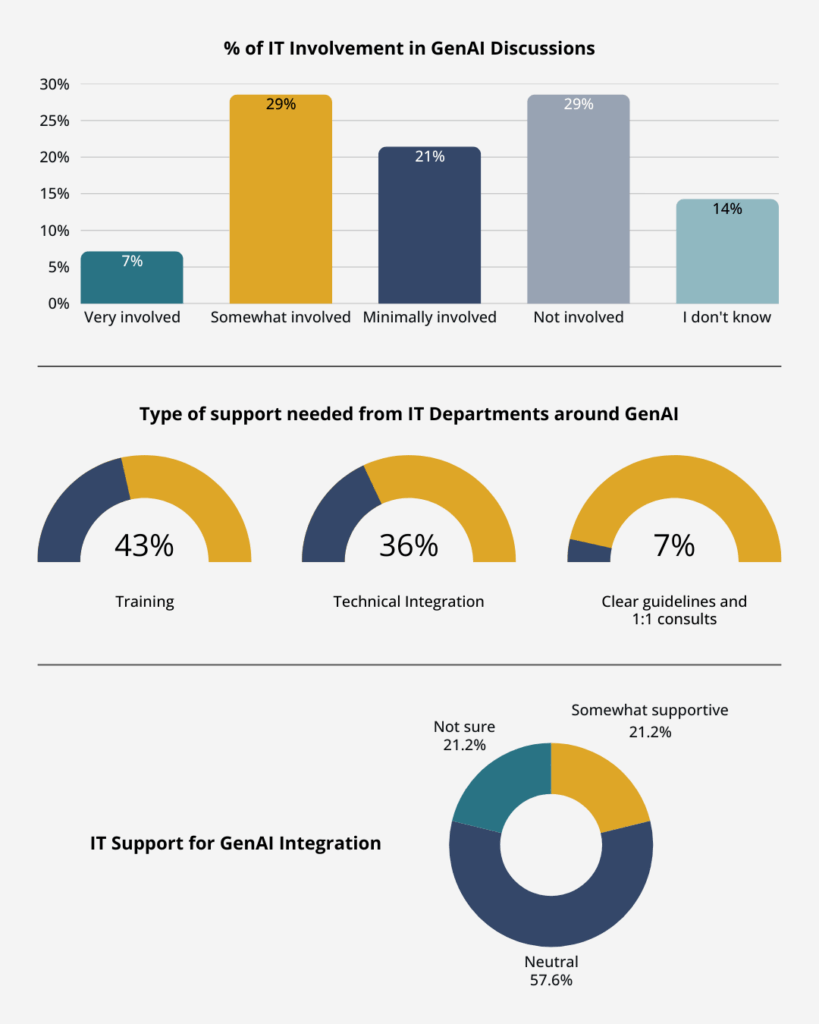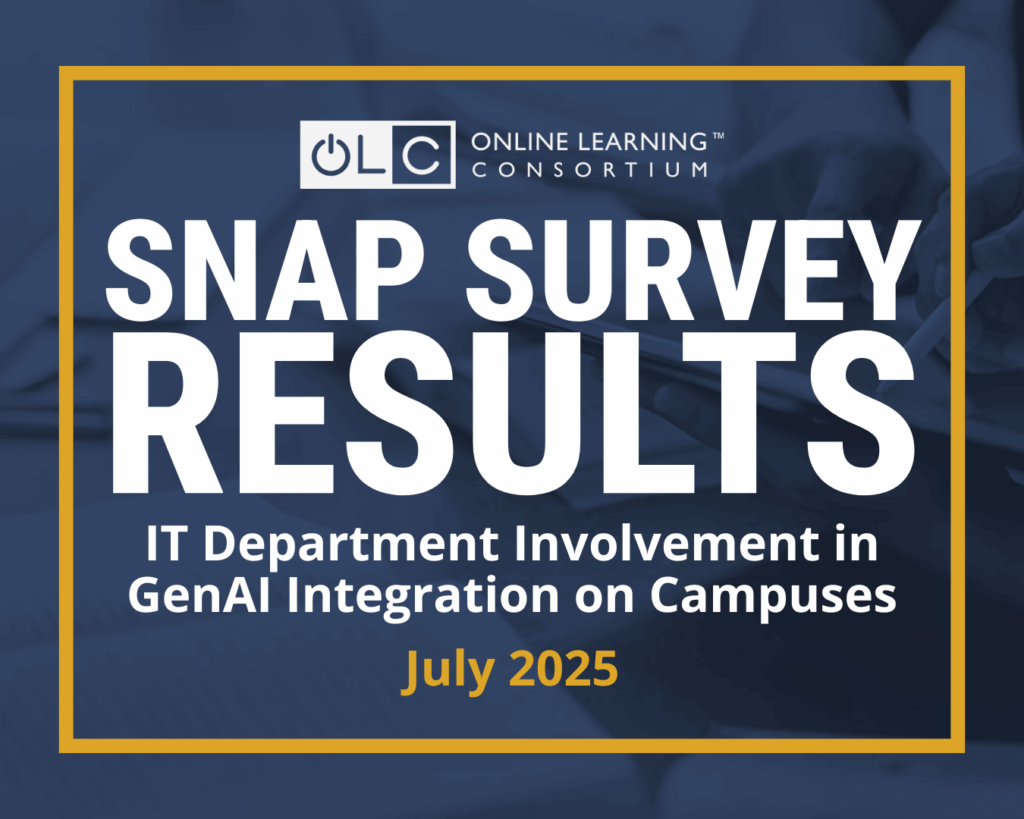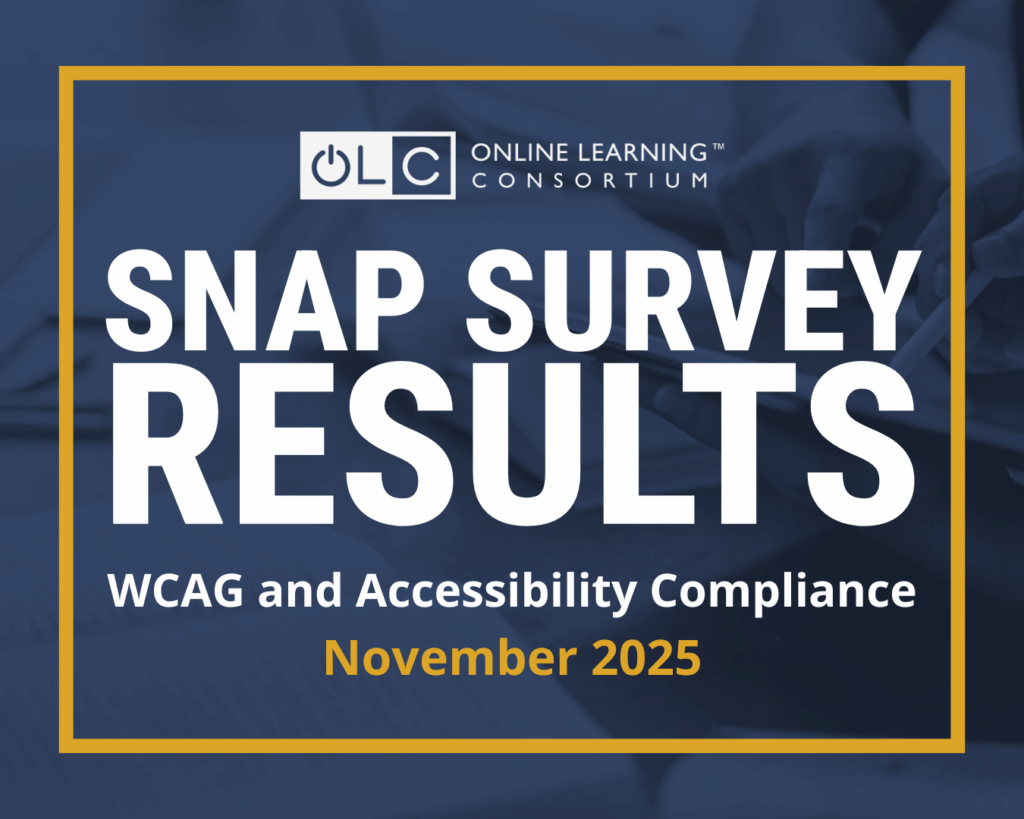
The topic of generative AI (GenAI) in higher education is rapidly gaining attention, with researchers examining its implications from multiple angles. Much of the current scholarship focuses on student and faculty experiences (Kamoun et al., 2024; Yazdi et al., 2025), while broader inquiries explore institutional readiness, AI literacy, and the evolving role of academic libraries in fostering digital literacy, particularly around GenAI (Buitrago-Ciro et al., 2025; Kong et al., 2025; Li et al., 2025). Despite this growing body of work, one key stakeholder group remains relatively underexplored: Information Technology (IT) departments.
IT departments are critical to institutional success, serving as the backbone for both operational continuity and digital innovation. They manage everything from Wi-Fi and cybersecurity to classroom technology upgrades. Given their expertise and infrastructure knowledge, IT teams are well-positioned to contribute to GenAI adoption, integration, and governance efforts in higher education. However, their role in this domain has received limited attention in the literature.
While dedicated studies on the role of IT departments in GenAI initiatives are lacking, existing research on broader AI implementation in higher education offers some insights. For example, IT staff are occasionally included in cross-functional committees tasked with developing GenAI-related policies and ethical guidelines (Baytas & Ruediger, 2025), and may also be responsible for negotiating tool licenses or ensuring secure integrations (Yusuf et al., 2024). Some institutions have even explored building proprietary GenAI systems for internal use, with IT leading the charge (Baytas & Ruediger, 2025).
Institutional culture often shapes the degree to which IT departments are involved in academic innovation. Findings from the July Snap Survey suggest that involvement is uneven. Equal portions of respondents (28.57%) reported that their IT departments are either Somewhat Involved or Not Involved At All in GenAI-related teaching and learning discussions. An additional 21.43% indicated that IT is Minimally Involved and participates only when explicitly asked. Over half (57.14%) described their IT department’s stance as Neutral, showing no clear support or opposition to GenAI integration in academic contexts. Only 21.43% of respondents indicated that their IT departments are supportive and willing to engage when invited.
Despite this tepid engagement, the survey also highlights clear opportunities for increased IT collaboration. Two of the most desired contributions from IT include leading training and workshops on GenAI tools (42.86%) and supporting technical integrations with learning management systems or other instructional technologies (35.71%). Additionally, 64.39% of respondents reported being Somewhat Confident in using GenAI, indicating a potential readiness to engage if appropriate institutional support is available.
Based on these findings, higher education institutions may wish to consider the following strategies to better leverage IT expertise and strengthen GenAI integration in teaching and learning:
- Invite IT into the conversation: Reach out to IT representatives to involve them in GenAI discussions early. Their technical knowledge and understanding of institutional systems can provide essential context for strategic planning.
- Identify collaborative partners: Explore whether your IT department includes instructional technologists, project managers, or training specialists who can co-lead professional development efforts related to GenAI.
- Establish cross-functional teams: Create institutional task forces that bring together IT, academic leadership, and faculty to coordinate GenAI-related policy development, infrastructure planning, and implementation.
- Promote shared goals: Emphasize the mutual benefits of collaboration, such as more secure tool integrations, scalable training models, and alignment between pedagogical innovation and technological capacity.
As GenAI continues to reshape the educational landscape, IT departments have the potential to serve as crucial allies—not only in managing technological infrastructure but also in advancing responsible, institution-wide adoption strategies. To fully harness the transformative potential of GenAI in higher education, institutions must move beyond siloed innovation and foster cross-functional collaboration. Engaging IT departments as proactive partners in GenAI adoption not only enhances technical feasibility but also promotes scalable, secure, and pedagogically aligned solutions. Institutions that cultivate these collaborations will be better positioned to navigate the evolving landscape of digital education with confidence and care. The survey data suggest a disconnect between GenAI’s rising prominence in education and the degree to which IT departments are currently engaged. Bridging this gap represents both a challenge and an opportunity—one that requires intentional outreach, shared planning, and a recognition that the future of educational technology is a collective responsibility.
References
Baytas, C., & Ruediger, D. (2025, May 1). Making AI Generative for Higher Education: Adoption and Challenges Among Instructors and Researchers. https://doi.org/10.18665/sr.322677
Buitrago-Ciro, J., Samokishyn, M., Moylan, R., Hernández Pérez, J., Bakare-Fatungase, O., & Firdawsi, C. (2025). Bridging the AI gap: Comparative analysis of AI integration, education, and outreach in academic libraries. IFLA Journal. https://doi.org/10.1177/03400352251325274
Kamoun, F., El Ayeb, W., Jabri, I., Sifi, S., & Iqbal, F. (2024). Exploring Students’ and Faculty’s Knowledge, Attitudes, and Perceptions Towards ChatGPT: A Cross-Sectional Empirical Study. Journal of Information Technology Education, 23, 4. https://doi.org/10.28945/5239
Kong, S.-C., Korte, S.-M., Burton, S., Keskitalo, P., Turunen, T., Smith, D., Wang, L., Lee, J. C.-K., & Beaton, M. C. (2025). Artificial Intelligence (AI) literacy – an argument for AI literacy in education. Innovations in Education and Teaching International, 62(2), 477–483. https://doi.org/10.1080/14703297.2024.2332744
Li, M., Xie, Q., Enkhtur, A., Meng, S., Chen, L., Yamamoto, B. A., Cheng, F., & Murakami, M. (2025). A Framework for Developing University Policies on Generative AI Governance: A Cross-national Comparative Study. https://doi.org/10.48550/arxiv.2504.02636
Yazdi, N. A., Zamaniahari, U., KhadiviMaleki, H., & Hasanabadi, P. (2025). Readiness to use artificial intelligence: a comparative study among dental faculty members and students. BMC Medical Education, 25(1), Article 1006. https://doi.org/10.1186/s12909-025-07621-w
Yusuf, A., Pervin, N. & Román-González, M. (2024). Generative AI and the future of higher education: a threat to academic integrity or reformation? Evidence from multicultural perspectives. International Journal of Educational Technology in Higher Education, 21(21). https://doi.org/10.1186/s41239-024-00453-6
 As senior researcher at OLC, Carrie designs, conducts and manages the portfolio of research projects that align with the mission, vision, and goals of the Online Learning Consortium. She brings with her over 15 years of experience as an online educator and instructional designer with a passion for research. She has peer-reviewed publications covering a variety of topics such as open educational resources, online course best practices, and game-based learning. In addition to a strong background in higher education teaching and instructional design, Carrie brings with her extensive experience in customer service and small business management. She holds a PhD in Educational Technology from Arizona State University, an MS in French from Minnesota State University, and BA in French from Arizona State University.
As senior researcher at OLC, Carrie designs, conducts and manages the portfolio of research projects that align with the mission, vision, and goals of the Online Learning Consortium. She brings with her over 15 years of experience as an online educator and instructional designer with a passion for research. She has peer-reviewed publications covering a variety of topics such as open educational resources, online course best practices, and game-based learning. In addition to a strong background in higher education teaching and instructional design, Carrie brings with her extensive experience in customer service and small business management. She holds a PhD in Educational Technology from Arizona State University, an MS in French from Minnesota State University, and BA in French from Arizona State University.





